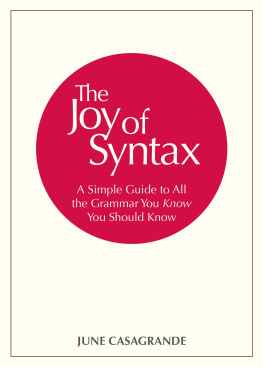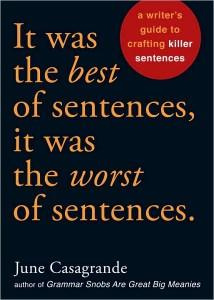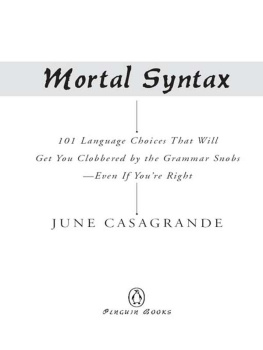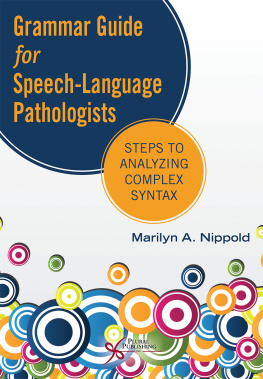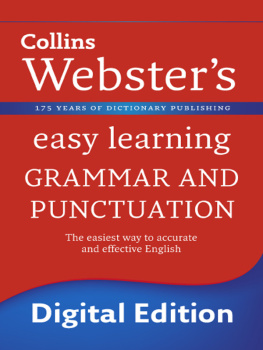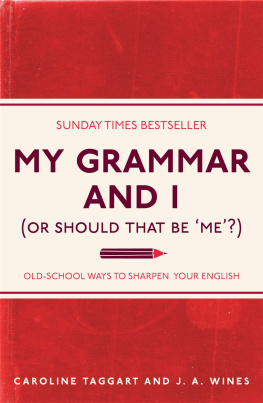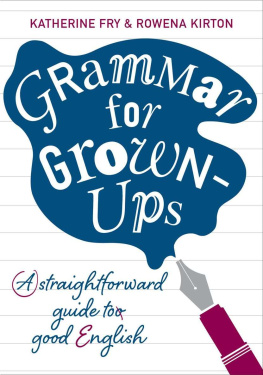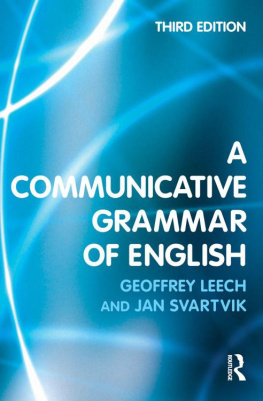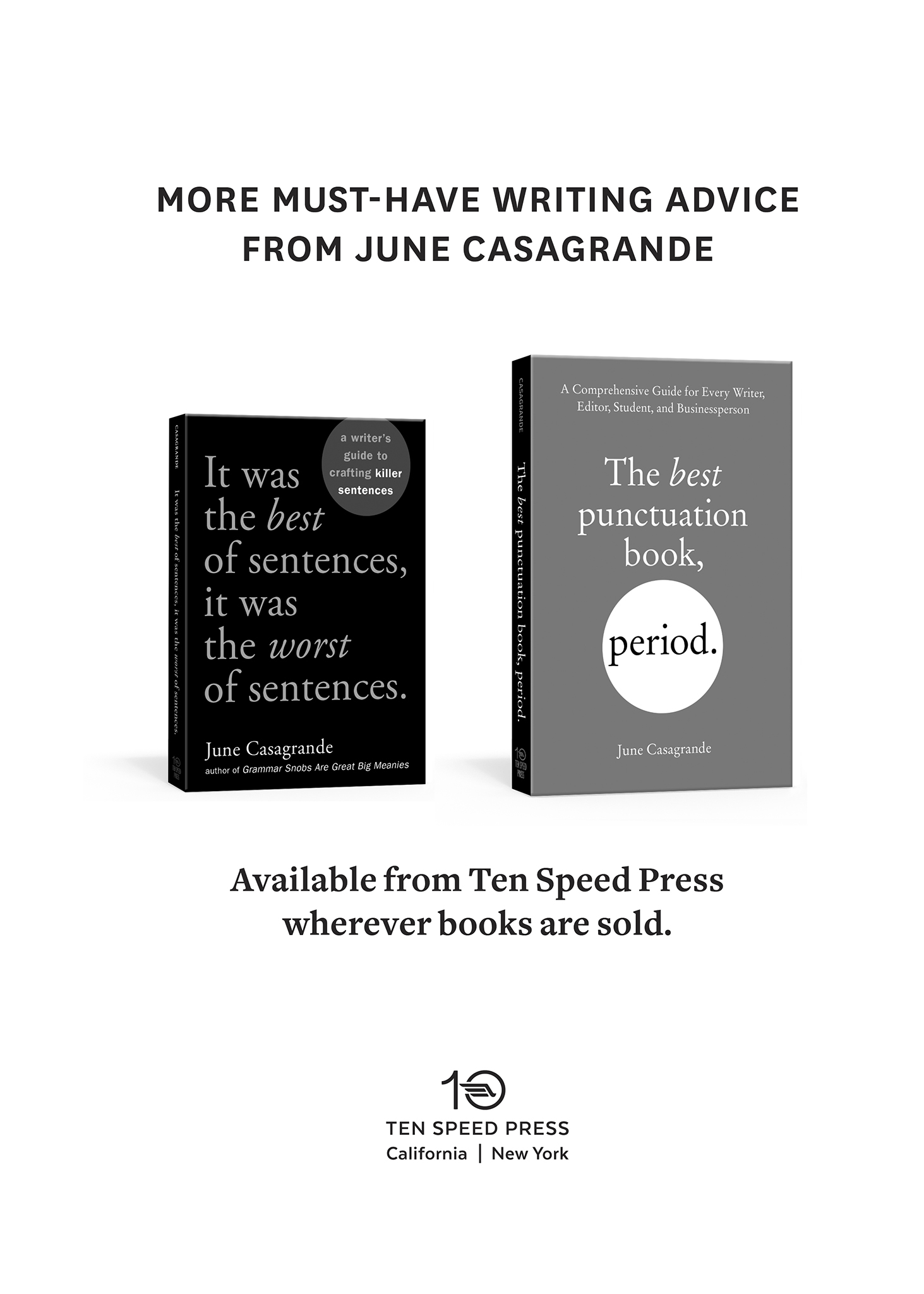Contents
ACKNOWLEDGMENTS
Thanks to my agent, Laurie Abkemeier; my editor, Lisa Westmoreland; my designer, Christine Innes; and the copy editors, proofreaders, and publicists who toiled in anonymity to make this book better. Youre all very much appreciated! Also thanks to Ted, for everything, and to Maxine Nunes, Christa Faust, Treacy Colbert, and all the members of my women writers lunch group for ten years of making this solitary occupation a little less solitary.
GLOSSARY
A
Adjective: A word that describes a noun.
Adverb: A diverse class of words that perform any of a number of functions. Adverbs can modify verbs, adjectives, and other adverbs. They can answer the questions When? Where? or In what manner? Or they can provide further information on whole clauses or sentences, in which case theyre called sentence adverbs.
Appositive: A noun phrase that restates another noun, usually for clarity, effect, or added specificity. As in A passerby, a jogger, witnessed the accident.
Aspect: The way the action of a verb either extends over time or is indicated as complete. There are two aspects in English: perfect, which means a completed action, as in He has finished , and progressive, which indicates an ongoing action, as in She is listening .
Attributive noun: A noun that modifies another noun, like shoe in shoe store .
Auxiliary verb: A helper verb that works with another verb to express time or duration or, in the case of modal auxiliaries, qualities like ability and possibility. The main auxiliaries are be and have . Modals include can , might , and should .
C
Case: A property of a noun or pronoun that indicates whether its a subject ( He likes pizza ), an object ( Pizza doesnt like him ), or possessive ( His pizza arrived cold ).
Clause: Usually, a unit containing both a subject and a conjugated verb.
Conjunction: A class of words that connect other words or groups of words.
Coordinating conjunction: A closed set of words that includes and , but , and or and that connect units of equal grammatical status.
Coordination: Using coordinating conjunctions to join units of equal grammatical status, be they nouns, verb phrases, whole clauses, or other units.
Copular verb: Also called linking verbs, copular verbs deal with being, seeming, becoming, or the senses. The most common copular verb is be (and its conjugated forms), as in They are happy . Because copular verbs reflect back on the subject, a noun phrase, they usually take adjectives (like happy ) instead of adverbs (like happily ) as their complements.
Count noun: A noun that has a possessive form and expresses as individual units, as opposed to a noncount noun, which emphasizes a single quantity.
D
Dangler: A modifying word or phrase that, due to its location in the sentence, is not clearly associated with the word its modifying.
Dependent clause (also called a subordinate clause): A unit containing both a subject and a predicate that cannot stand alone as a sentence, often because its subordinated with a conjunction like unless , if , or until .
Determiner: An article, demonstrative, quantifier, or possessive that modifies a noun to indicate definiteness or possession.
Dummy operator: The word do and its inflected forms when its inserted into a sentence to perform a specific operation, most notably forming a statement like You know algebra into a question like Do you know algebra ?
F
Flat adverb: A word without a - ly ending that is used to modify an action, as slow in Go slow.
Fragment: A grammatically incomplete sentence punctuated as if it were a complete one.
G
Gender: Indicating male or female, the way he and she do.
Genitive: Another word for possessive.
Gerund: The -ing form of a verb when its used as a noun.
Grammar: Can mean several things. Its most useful to think of grammar as sentence mechanicsthings like the way in which verbs are conjugated to match subjects and how to form plurals. But the term is sometimes used so broadly as to mean proper language including usage and punctuation. Its also used narrowly to refer to a grammara book analyzing and explaining how language works.
I
Idiomatic: Describes a usage that is so popular its considered correct even though it does not conform to the rules of syntax.
Imperative: A command. Get out! is an example of an imperative.
Independent clause: A clause that can stand alone as a sentence.
Inflect: The way a word changes form to express tense, number, gender, and so on. When verbs are inflected to match their subjects, the process is often called conjugation.
Interrogative: Forming a question.
Intransitive verb: A type of verb that does not take a direct object, for example, swim in We swim .
Irregular: A word that doesnt follow the regular pattern for forming its past tenses or plurals. For example, unlike the regular verb walk , which forms its past tense and past participle by adding - ed , the irregular verb think forms its past tense and past participles with the irregular form thought .
M
Modal auxiliary: A class of verbs including can , might , and should that usually work with other verbs to add information about ability, possibility, and so on.
Mood: English grammar has three moods: indicative, which means direct statements; imperative, which means commands; and subjunctive, which indicates contrary to fact situations like wishes and suppositions. I wish you were here is an example of the subjunctive mood, using the verb form were where the indicative form would be was .
N
Nominal adjective: An adjective functioning as a noun, like the underprivileged or the meek .
Noncount noun: A noun that emphasizes a single quantity and, as such, is not customarily considered to have a plural form: gasoline, wealth, and politics are examples.
Noun: A person, place, or thing, which includes abstract things like fear and persistence .
O
Object: A noun, pronoun, phrase, or clause that functions as the object of a transitive verb or a preposition.
Operator: An auxiliary verb used to perform a specific grammatical operation, the way do works in turning the statement You like bagels into the question Do you like bagels ?
P
Participle: A form of a verb used with an auxiliary verb to indicate time or duration, including past participles like bought in He has bought and progressive participles like snowing in It is snowing .
Phrasal verb: A combination of a verb plus one or two words, often including a preposition, that give the verb distinct meaning from the same verb standing alone. For example, give up is a phrasal verb because it means something different than give .
Phrase: A unit of one or more words doing the job of a noun, verb, adjective, etc., in a sentence.
Predicate: The part of a sentence containing the verb and, often, other information about the subject.
Preposition: Any of a specific set of words that pair with objects to provide additional information to a sentence. In many cases, that information is locational: on , in , above , below , etc.
Pronoun: Any of a finite set of words that stand in for nouns. These include personal pronouns like I and them , relative pronouns like who and that , indefinite pronouns like anyone , and other subcategories of pronouns.
R
Relative clause: A clause that is headed by a relative pronoun or an implied relative pronoun and that postmodifies a noun.
Relative pronoun: The relative pronouns are that , which , who , and whom . Their special function is to head up relative clauses, which modify a noun, as in The apple that had a brown spot .

